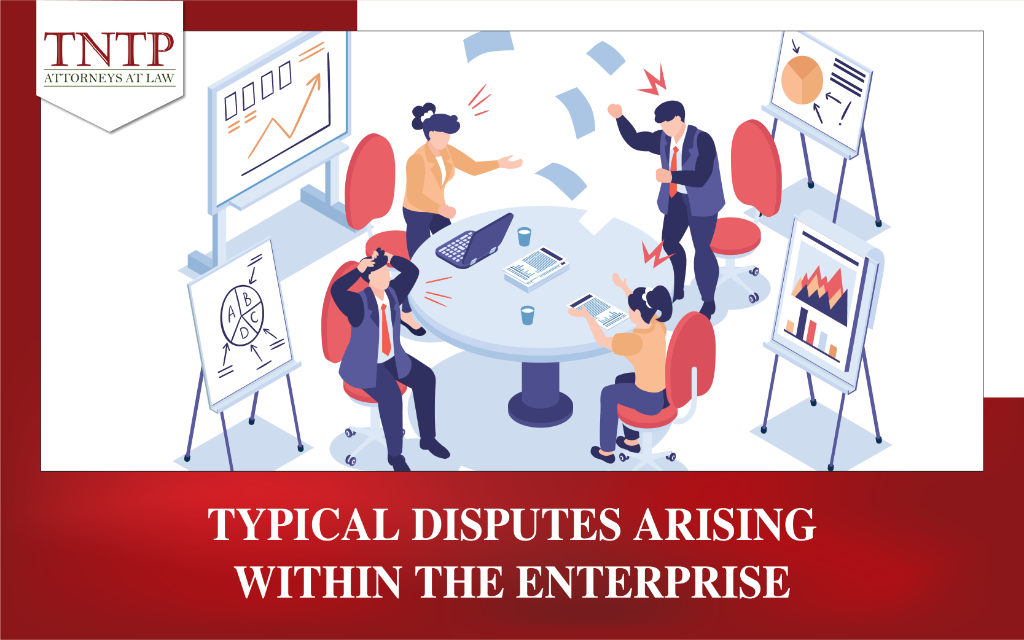Currently, internal enterprise disputes are much more complex and have gotten much worse. The most common are disputes related to the right to access information of members, capital contribution, establishment, operation, dissolution, and corporate mergers, Internal enterprise disputes can arise for many different reasons, but in essence, they are due to conflicts, conflicts of rights, and obligations of subjects in the organization and operation of the enterprise. To better understand the typical disputes arising within the enterprise, let’s find out the article below with TNTP.
1. Disputes arising within the enterprise
According to the provisions of Clause 4, Article 30 of the Civil Procedure Code 2015, an disputes arising within the enterprise will satisfy the following two conditions:
First, disputes between the enterprise and its members, disputes between the enterprise and the manager in a limited liability company or a member of the Board of Directors, the director or general director in a joint-stock company, between members of the company.
Second, disputes related to the establishment, operation, dissolution, merger, consolidation, division, separation, transfer of assets of the enterprise, and transformation of the organizational form of the enterprise.
Thus, it can be understood that internal disputes in an enterprise are conflicts and disagreements between individuals and organizations in the enterprise arising in the entire process from the establishment, operation, dissolution, merger, consolidation, division, separation, and transfer of assets of the company, transformation of the organizational form of the enterprise.
2. Common internal disputes arising within the enterprise
Disputes between the company and its members
Disputes between the company and its members include typical disputes:
- Disputes related to the obligation to contribute capital under the commitment to contribute/register on the business registration certificate between members/shareholders.
- Disputes over asset valuation when contributing capital, not transferring ownership of assets contributed as capital.
- Disputes over rights and interests, distribution of profits among members and shareholders.
- Disputes when transferring the capital contribution to the enterprise between members of the company or transferring the capital contributed to the company by that member of the enterprise to another person who is not a member of the company.
Disputes between the company and the manager of the company
Under contract 24, Article 4 of the Enterprise Law 2020, an enterprise manager is a manager of a private company and a company manager, including the owner of the private company, general partners, the chairman of the council, members of the Members’ Council, the President of the company, the Chairman of the Board of Directors, members of the Board of Directors, the Director or General Director and individuals holding different managerial positions as prescribed in the Charter company.
Disputes related to business managers are often quite complicated and fierce. Disputes arising related to the decisions of the General Meeting of Shareholders, the Board of Directors, and the Board of Members, do not accept the decisions because they think that these decisions are unfair, illegal, affecting the rights of shareholders, interests of shareholders, and members of the company.
Disputes between company members
A Member company is a person who contributes capital to the company and has partial or full ownership of the company. When contributing capital to the company, the company has ownership rights to the assets (contributed capital), and the company members have ownership rights to the company.
According to the provisions at point b, Clause 5, Article 6 of Resolution No. 03/2012/NQ-HDTP stipulating typical disputes between members of the company, specifically:
- Disputes about choosing a legal representative, disputes related to the rights and obligations of members and shareholders in the company.
- Disputes when liquidating assets, dividing debts among members of the company in case the company is dissolved.
- Disputes between members of the company related to the establishment, operation, dissolution, merger, consolidation, division, separation, and transformation of the company’s organizational form
3. Methods of resolving internal enterprise disputes
In resolving disputes between the company and its members, the resolution method is the same as that of commercial business disputes. Accordingly, there are four methods of solving the following:
- Negotiation method
- Mediation at the Mediation Center (commercial mediation)
- Settlement of disputes by arbitration
- Settlement of disputes by Court.
Above is the article of TNTP on “Typical disputes arriving in the enterprise”. Hope the above article provides you with useful information.
Best regards,







